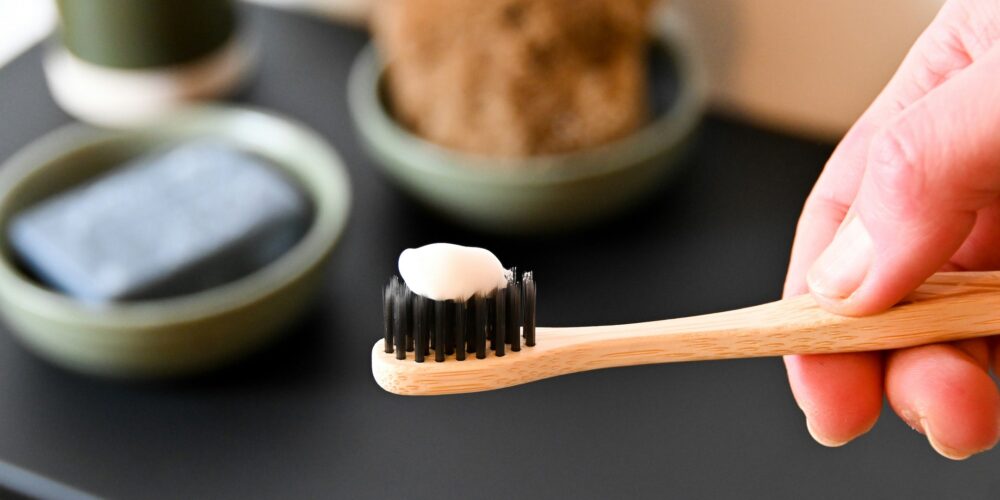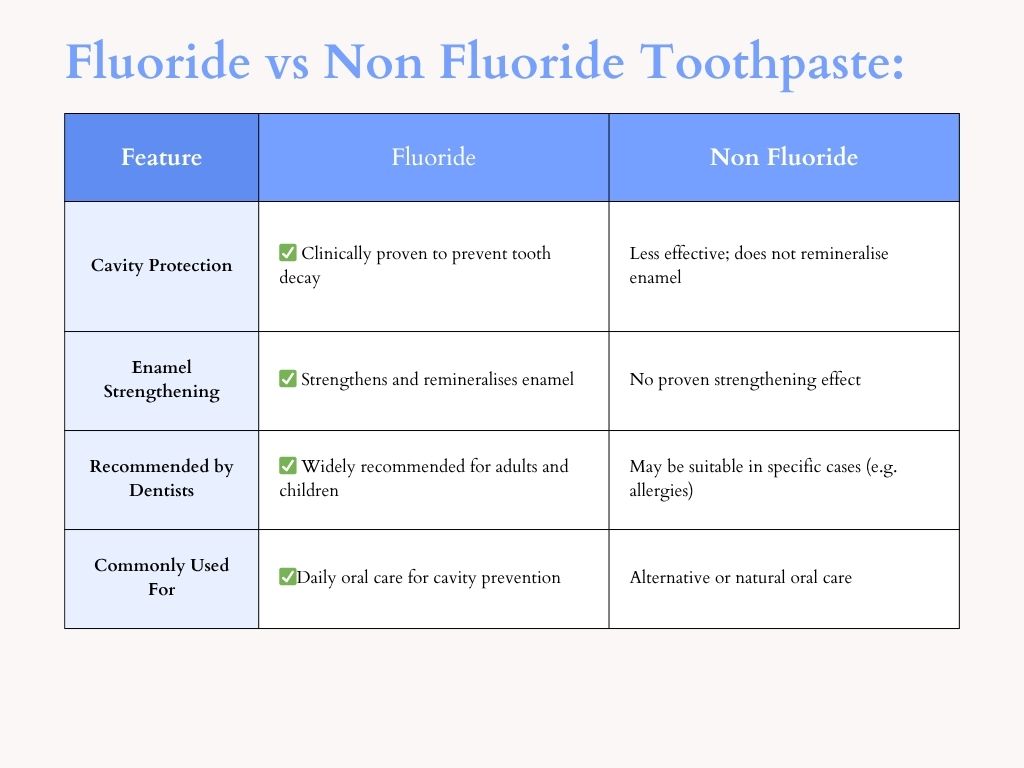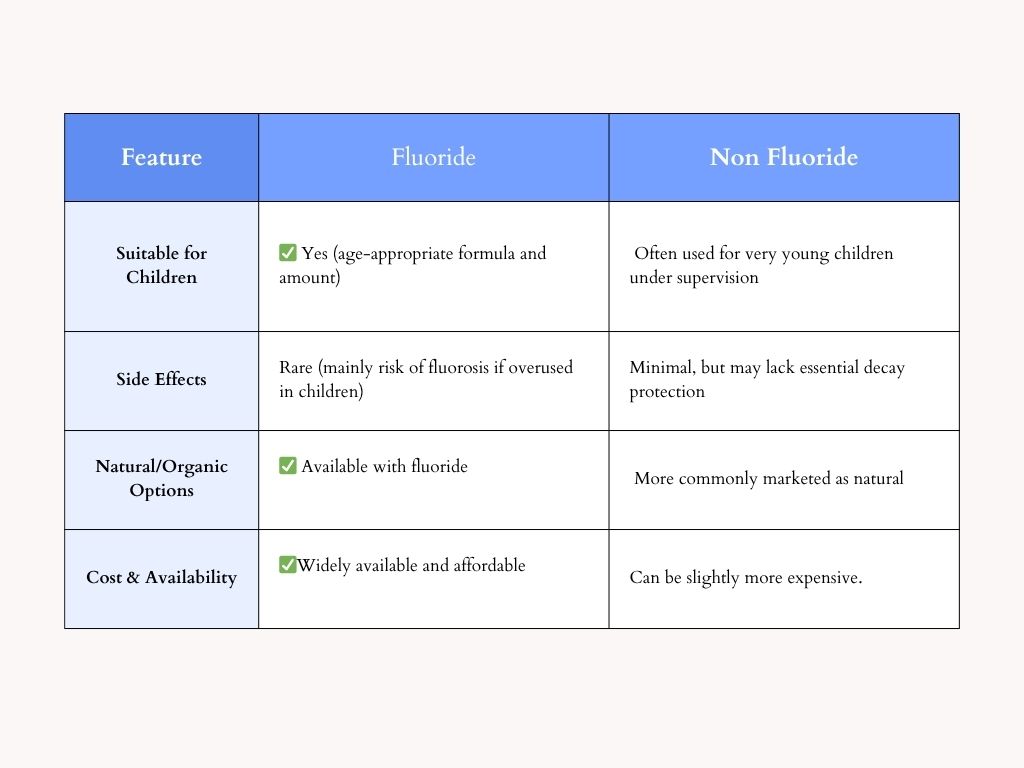
What is fluoride?
Fluoride is a naturally occurring mineral that is beneficial for dental health. It helps to strengthen tooth enamel and reduce the risk of cavities by making teeth more resistant to acid attacks and helping to repair early signs of decay. Fluoride is commonly added to water supplies and is also a key ingredient in many toothpastes.
Here at The Kensington Dentist, we always recommended a fluoride toothpaste. There are some occasions where exceptions can be made, and your treating clinician will let you know in your checkups.
Should you be using non-fluoride toothpaste?
The answer depends on your individual needs.
For Young Children: Children under the age of two should use only a smear of toothpaste (about the size of a grain of rice) to minimise the risk of swallowing too much fluoride. From age three and up, a pea-sized amount of fluoride toothpaste is recommended.
For Adults: Most adults benefit from fluoride toothpaste, especially those prone to cavities or with a history of dental issues.
There are, however, certain situations where non-fluoride toothpaste might be appropriate:
- People with fluoride sensitivity
- Those using alternative oral care methods (under the guidance of a dentist)
- Parents seeking a natural alternative for young children who can’t yet spit out toothpaste
What Does Fluoride Do?
As bacteria and sugars form acids that slowly lead to decay, fluoride works to strengthen the enamel (the protective surface around all your teeth) so it doesn’t succumb to it. Before a baby’s primary teeth start to emerge, their enamel is strengthened by the fluoride consumed through foods and beverages. When teeth break through the gums, these natural sources of fluoride help rebuild any weakened enamel as they grow in.
What About Non-Fluoride Toothpaste?
Non-fluoride toothpastes may still help clean teeth and freshen breath, but they do not offer the same level of cavity protection as fluoride-based formulas. Some fluoride-free products may include ingredients like xylitol, charcoal, or herbal extracts, but none are as thoroughly researched and proven to prevent tooth decay as fluoride.
Final Thoughts: Fluoride vs Non-Fluoride Toothpaste?
In most cases, fluoride toothpaste is the safest and most effective choice for preventing tooth decay and maintaining strong, healthy teeth. However, always speak with your dentist if you have concerns or specific medical needs.
If you’re unsure about which toothpaste is right for you or your child, feel free to ask one of our clinicians at your next visit—we’re here to help you make the best decision for your oral health.
Fluoride FAQs
1. Is fluoride toothpaste safe?
Yes, fluoride toothpaste is safe when used as directed. The amount of fluoride in toothpaste is regulated to ensure it’s safe for daily use. However, it’s important not to swallow large amounts, particularly for young children.
2. What is the risk of using non-fluoride toothpaste?
Non-fluoride toothpaste may clean your teeth, but it does not offer the same cavity protection as fluoride toothpaste. Without fluoride, you may be more susceptible to tooth decay, especially if you have a high sugar diet or are prone to cavities.
3. Can fluoride toothpaste help with sensitive teeth?
Yes, many fluoride toothpastes are specifically formulated for sensitive teeth. These formulations help reduce discomfort by strengthening enamel and reducing tooth sensitivity.
4. Are fluoride-free toothpastes more “natural”?
Many non-fluoride toothpastes claim to be natural, but that doesn’t always mean they are better for your oral health. While they may contain plant-based or herbal ingredients, they generally lack the scientifically-proven benefits of fluoride for cavity prevention.
5. Can fluoride toothpaste be used during pregnancy?
Yes, fluoride toothpaste is safe to use during pregnancy. It is important to continue good oral hygiene to avoid conditions like gingivitis, which is common during pregnancy due to hormonal changes.
6. Should I avoid fluoride toothpaste while whitening my teeth?
No, you do not need to avoid fluoride toothpaste during teeth whitening. In fact, it’s often recommended to continue using it. Whitening treatments—especially those containing peroxide—can temporarily weaken enamel and increase tooth sensitivity. Fluoride toothpaste helps to remineralise enamel and reduce sensitivity, making it a beneficial companion to whitening products.
However, for best results, you may want to use a fluoride toothpaste that’s also labelled as whitening or formulated for sensitive teeth, depending on your needs.


Our recommendations
- Colgate
- Sensodyne
- Oral B
Any questions, feel free to ask us at your next appointment!
